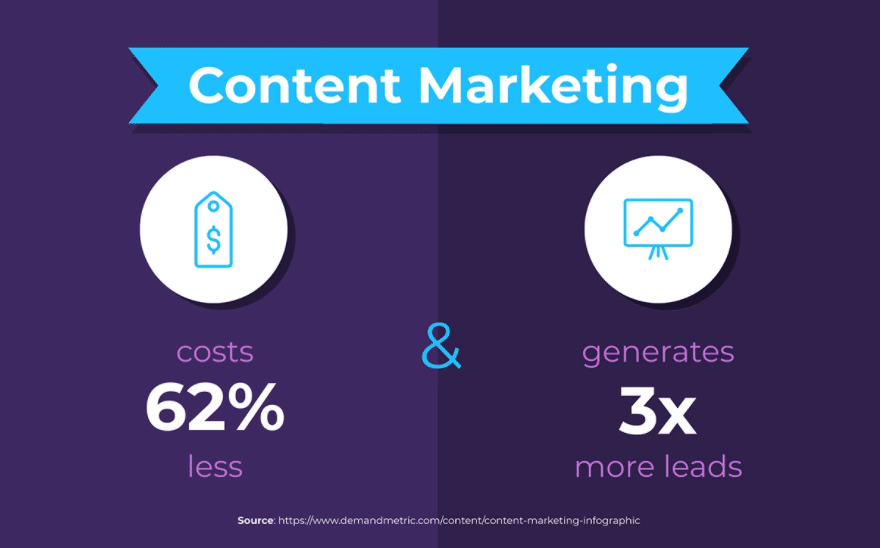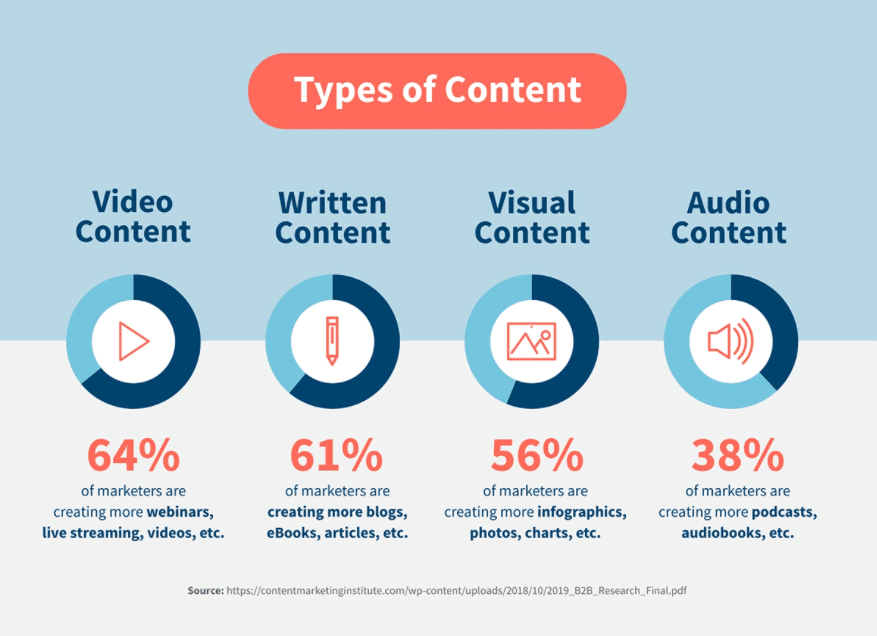A typical mantra in marketing is: “Content is king.” This also stands true for ecommerce marketing. Indeed, ecommerce content marketing is an essential way of promoting and sustaining your online business, and there are several things you can do to maximize its potential and earn the loyalty of your customers. It’s important to learn exactly how and why you should use content marketing to grow your ecommerce business, so continue reading for some expert tips and examples.
What is Content Marketing?
Content marketing is an integral part of any ecommerce marketing campaign, either as a supporting element or as the main marketing strategy. It’s a type of marketing that uses various types of online content that can either be downloaded or viewed online. These include videos, blogs, white papers, e-books, memes, infographics, quizzes, and everything in between. But content marketing doesn’t necessarily have to directly promote a product. Its main purpose is actually to establish the online presence of your brand and show potential customers that you’re experts in your field. With this in mind, it’s crucial to integrate your content marketing strategy with your brand strategy so that both are aligned in terms of:
- Business goals and objectives
- Targeting buyer personas
- Brand messaging
- Keyword strategy
- Journey or lead mapping
- Storytelling opportunities
What is Ecommerce Content Marketing?
As with “regular” content marketing, ecommerce content marketing is the strategic use of content to promote a brand, product or service, but with an end goal of persuading customers to buy. It includes things like tutorials or how-to articles related to what you’re selling, product videos or descriptions, customer stories, case studies, and pieces of brand journalism – to name a few. What makes ecommerce content marketing distinct from “normal” content marketing is how it’s approached: it promotes your business, provides valuable information about your product, and always has the goal of making a sale.
Ecommerce content marketing is essential to online businesses because it not only improves site rankings, it also boosts your credibility. You want your ecom businesses to be seen as an authoritative source of information in your industry, so having high-quality and relevant content will establish you as a reliable business and build trust among your site visitors over time.
Aside from promoting your products, ecommerce content marketing can also significantly boost organic and high-quality traffic to your website. This is because, with the help of SEO (search engine optimization), organic searches based on specific topics and keywords can attract visitors to your site who are specifically interested in what it is you’re offering. If your content is then engaging and relevant, they are likely to stay on your website and consider buying from you – it’s as simple as that!
What Types Of Content Are Best for Ecommerce?
Online consumers are inundated by all sorts of paid advertisements. Whether they’re browsing social media, watching a YouTube video, or checking their emails, they’re bombarded by ads and promotional content. Most online advertisements are the results of algorithms that adjust to target specific consumer demographics based on their online behavior.
However, many of these ads are unsolicited, making them annoying as they interrupt the consumers’ enjoyment of online content. Ecommerce content marketing solves this problem by showing potential customers or clients content that they either enjoy seeing, or that relates to a specific need they have. This makes it a type of inbound marketing strategy. Instead of actively initiating an outbound marketing campaign, like cold calling, content marketing is a more personal way of attracting potential customers who are more receptive to your message.
When devising an ecommerce content marketing strategy, remember that you don’t necessarily have to create all types of ecom content, nor promote your content on all available marketing channels: you can simply focus on the types of content and platforms that best suit your business and target audience. It’s important to test, test, test, until you know what works for your business.
Here are some types of content that you can use in your ecommerce marketing:
- Blogs & articles: Blog posts and articles that are highly informative and centered on a specific, relevant topic are some of the most popular forms of ecommerce content. These articles can transform your website into an encyclopedic source for site visitors who are looking for a particular solution. Articles also don’t have to be solely focused on your product: they could be loosely related to your industry.
Example: if you sell hair care products, you could have articles that explain how each of your products can be used, as well as articles that list the top 10 mistakes people make when caring for their hair (and how your products solve these!).
- White papers: If you’re a B2B ecommerce business, you can gain greater credibility and authority in a particular market if you present well-documented research papers, complete with statistical data, graphs, and analyses. You should be hyper-focused on your research topics when doing this.
Example: if you’re a tech company selling an ergonomic keyboard and mouse combo, you might create a research paper about incidence of carpal tunnel syndrome among programmers.
- Videos: Video marketing is wide-ranging and can achieve many different goals. For example, instructional videos about your product can be used as an end-of-funnel marketing tactic to push your site visitors into making a purchase. Meanwhile, high-resolution, cinematic productions can be used to attract potential customers to your website. You can also use animated shorts, interactive videos, or video testimonials from clients, customers, or even influencers. No matter how you approach it, video marketing should be entertaining, informative, and persuasive, and appeal to both reason and emotion.
- Customer-generated content: This type of content can include testimonials, reviews, and case studies, all of which can be very persuasive to prospective customers who may want a second, unbiased opinion before making a purchase. Basically, customer-generated (or user-generated) content helps leads to decide whether they want to buy from you or not. This isn’t only because of the bandwagon effect, but also because customer feedback provides tangible evidence that your product is worth the investment.
- Interactive content: Aside from interacting with customers via social media, emails or private messages, you can also create interactive types of content that are fun and informative, such as games, quizzes or surveys. For example, an online quiz titled ‘What Skin Type Do You Have?’ can be used as a way of guiding customers towards a brand’s recommended skincare product based on their answers. Similarly, you can incentivize surveys of your product by offering followers a prize, like a discount, whenever they complete one. Interactive content like this is effective because it forces the customer to engage with your brand in a fun and interesting way.
- Infographics: If your ecommerce business specializes in more technical products, creating graphics with graphs, flowcharts, and conceptual drawings or schematics can be very beneficial to prospective customers. Infographics like these should summarize complex ideas into one page of pictorial illustrations, making it easier for potential customers to understand your business. Snappier pieces of content complement white papers or long-form blogs by offering instant gratification. They’re more visually stimulating and help to pique interest.
7 Tips For Ecommerce Content Marketing
Over the past few years, algorithm updates on search engines like Google, as well as social media platforms, has meant that there is now a much stronger emphasis on the quality of content being produced than there was in previous years. When creating a content marketing plan for ecommerce, your content should have the following characteristics:
- It must tell a relatable story that audiences can connect with and use to humanize you
- It must be unique to your brand so that it’s instantly recognizable and hard for others to copy
- There should be an emphasis on quality over quantity, focusing on the usefulness of the content
- It should be less focused on promoting products and more on genuinely helping people
- It must earn the trust of prospective leads and facilitate customer loyalty
- It should be a true reflection of your product: it’s better to under-hype and over-perform!
- It must be SEO-friendly so that it’s easily read and indexed by Google





